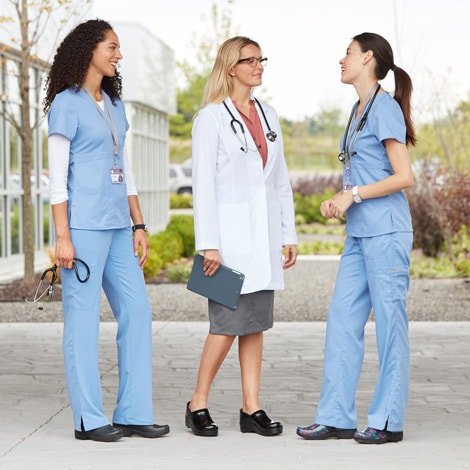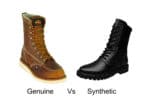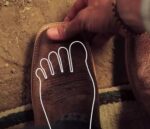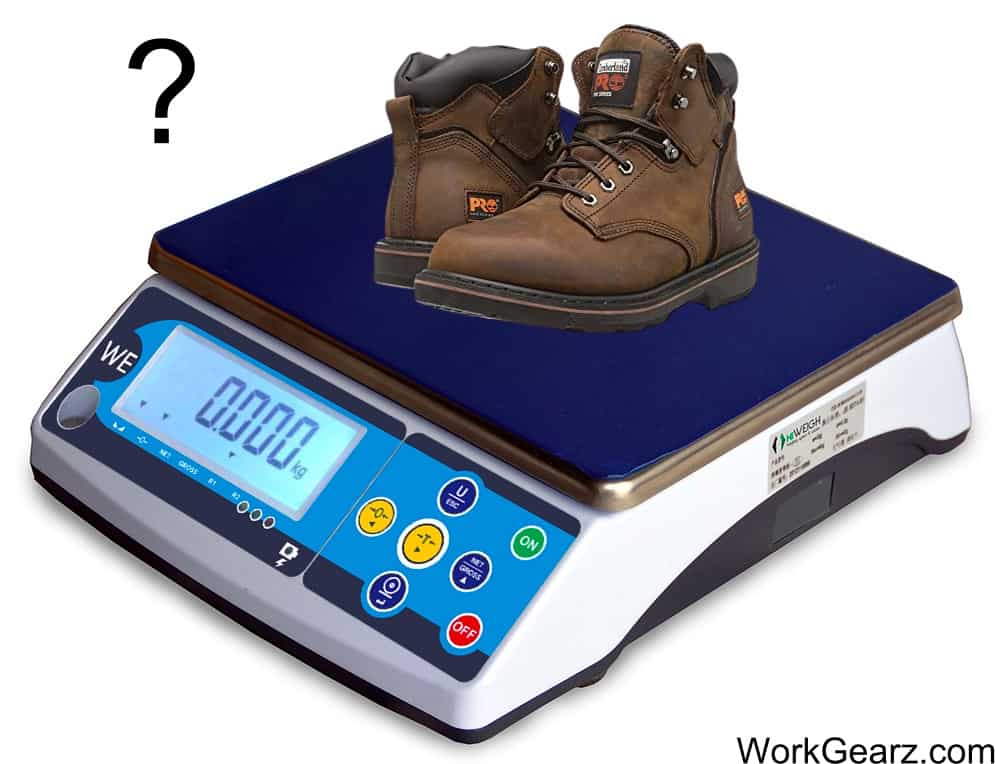It isn’t just construction workers who have a day-long or a night-long shift. Nurses and doctors are always up on their feet as well. Long shifts take the heaviest toll on feet. What’s required the most in such a scenario is a pair of comfortable footwear. That’s where clogs steal the cake.
Nurses and doctors wear clogs because these shoes are super comfortable. By comfortable, we don’t mean just padded and soft. Alongside being padded and soft, clog shoes also provide arch support and a solid grip that resists friction while you’re walking.
Wearing clogs brings all-around protection: the highest quality clogs are slip-resistant, durable and strong, and, most importantly, they have a slip-on and slip-off design. Since clogs do not have laces, nurses and doctors that are usually running by the clock find it very easy to wear these shoes.

If an emergency suddenly pops up and you’ve been relaxing your feet outside the confines of your shoes, imagine the kind of rush you’ll be put through if your shoes have laces. That’s why clogs are the most preferred footwear for both nurses and doctors alike: it takes literally a second to slip them on.
Expect to learn everything about clogs and their popularity amongst nurses and doctors. In this guide, we will walk you through the reasons why nurses and doctors wear clogs, things you should consider when buying clogs, some of the best clogs that you can buy, and much more!
Why Do Nurses and Doctors Prefer Clogs?
Nurses and doctors have rigorous shifts but they don’t have to run or perform heavy-duty work. They’re mostly on their feet but they’re not on a battlefield. Clearly, they do not need tactical boots. Thus, the best option for them is clogs.
Clogs keep the feet very comfortable in a lot of ways. They have arch support that keeps the feet aligned with the midsole. The many benefits of this particular feature are as follows.
1.) Clogs support the ankles (the entire foot in general). It reduces the strain that a tiring shift can otherwise cause.
2.) With optimum support and shock-absorbing properties, clogs ensure that the healthcare practitioners do not have to deal with foot aches or backache.
3.) Clogs release tension from the ball of the feet since they support the entire foot uniformly.
4.) Clogs do not overheat the feet. They’re breathable and usually open at the back. This specific design assists in easily removing the clogs and putting them on immediately in case of an emergency within seconds.
3 Benefits of Wearing Clogs: How Do They Make a Hectic 12-hour Shift Comfortable?
Yes, they support the feet and ensure that there is no lower back pain or any kind of discomfort. But, there’s more to clogs! Wearing clogs offers more than just comfort and support. Keep reading to find out more!
1.) Clogs Mitigate the Risk of Taking a Fall
Laces can be deal breakers in the OT. Imagine carrying a tray with a scalpel and surgical tools! What if your laces are open or loose? You won’t be able to notice them since the operation obviously has your entire attention.
The result would be an accidental fall. Many nurses go through this problem and get seriously injured. That’s the reason that most nurses and doctors nowadays prefer wearing clogs.
2.) Clogs Improve Overall Hygiene
As we’ve already mentioned, clogs don’t have laces! It means you won’t have to touch your shoes again and again. As a nurse or a doctor, your hands can give life and take it away as well.
The cleaner they are, the better it is, for the patients as well as you! You can easily slip your feet inside and take them out of your clogs without having to touch the shoes at all.
3.) Clogs Offer Protection from Spills
Clogs for nurses and doctors are mostly made of high-quality rubber or synthetic. The upper portion is specially made very strong and abrasion-resistant.
As a medical practitioner, it’s highly likely that you might have all sorts of spills. The surface of clogs will protect your feet from coming in contact with those spills.
The best part is that the surface of clogs won’t catch stains from any sort of spillage either. You can simply wipe them with a cloth or wash them with water and they’ll look as good as brand new!
See also: How to Shrink Crocs? (Fast and Simple Ways)
How to Find Out if The Clogs You’re Buying Will Offer the Comfort They Endorse?
It’s very important to be a wise buyer when shopping for clogs since you’ll have to wear them for no less than 10 or 12 hours daily if you’re a nurse or a doctor.
Hence, we have made a list of some features that you should not ignore when you’re buying clogs for work. Have a look!
1.) They Should be Slip-Resistant
The clogs that you’re buying should be slip-resistant. There’s naturally going to be spillage and the chances that you might step on those are also very high.
If the shoes you’re wearing won’t be skid-resistant, you’re most likely going to trip or slip over something and get hurt.
So, whenever you buy clogs, make sure you double-check the features! The sole should always offer good resistance against slipping and should be resistant to abrasion.
2.) They Should Offer a Good Grip
Working as a nurse or a doctor is rigorous. Your feet don’t get a lot of rest. When the feet are constantly in the confines of shoes, things might get sweaty.
Naturally, it will make the feet slip and move a lot inside the shoes while walking. It does not just make walking uncomfortable but unsafe too.
That’s why nurses and doctors should take two features very seriously:
1.) The clogs should be moisture-wicking. It will ensure that your feet stay dry.
2.) The clogs should have shanks or some sort of support to keep the feet from moving a lot inside the clogs.
3.) They Should be Strong and Impact-Resistant
It’s natural that you might drop scalpels or even a tray on your feet sometimes. What’s going to be the use of wearing shoes that can’t take the impact? You’ll end up hurting your feet.
Thus, the clog shoes you’re wearing should be strong. The upper part of the clogs should have a strong surface that can absorb the shock from an impact before it can reach your feet.
4.) They Should be Highly Abrasion-Resistant
Accidental spills such as fluids and even chemicals are very common in hospitals. Nurses and doctors, thus, require footwear that can withstand abrasion and not let the spills pass through the surface.
Ensure that the clogs you’re buying have a good abrasion resistance index.
5.) They Should be Breathable
Walking continuously or standing for hours can make your feet hot. If your shoes aren’t breathable, your feet will overheat and sweat a lot. Therefore, the clogs you’re buying should have a breathable surface.
3 Best Clogs for Nurses and Doctors
1.) Unisex Men’s and Women’s Specialist Ii Clog by Crocs
- THE PERFECT WORK CROCS: Do your shoes live up to your career specialty? The Specialist II Clogs are the Crocs work shoes men and women need because they are perfect for long days and nights
- EASY TO CLEAN: Crocs Specialist II clogs are easy to clean by just using soap and water and allowing for a quick dry
- WHAT SIZE SHOULD I BUY?: These Crocs for work offer a roomy fit and we recommend ordering a size down to the next largest whole size
Prices pulled from the Amazon Product Advertising API on:
Product prices and availability are accurate as of the date/time indicated and are subject to change. Any price and availability information displayed on [relevant Amazon Site(s), as applicable] at the time of purchase will apply to the purchase of this product.
These amazing work shoes are the best clogs in the current market. They’re 100% synthetic and absolutely breathable. The sole is made of Ethylene Vinyl Acetate that’s highly resistant to slipping and skidding.
1.) It’s pretty easy to clean these clogs. You can apply soap and wash them under running water. Nothing else is needed.
2.) The rubber foam footbed offers absolute comfort. It offers perfect support to the toes and metatarsal bones. Hence, these clogs are perfect for long shifts of 10 to 12 hours.
3.) The upper surface is resistant to oil and water alike.
4.) They’re moisture-wicking as well.
Cons: Customers report that the size can be bigger than usual. However, the company has its own size chart. Refer to that size chart before buying these clogs to get a true fit.
Check Price and Reviews on Amazon2.) Women’s Neria Pro Embellished Clog by Crocs
- WORK CLOGS FOR WOMEN: Neria is dependable and ready to make the rounds with protection and comfort every step of the way. These are the work Crocs women need for long days and nights
- EASY TO CLEAN: Crocs Neria Pro II clogs are easy to clean by just using soap and water and allowing for a quick dry. The updated style includes removable, washable footbed liners
- WHAT SIZE SHOULD I BUY?: These slip resistant work shoes offer a relaxed fit and we recommend ordering a size down to the next largest whole size
Prices pulled from the Amazon Product Advertising API on:
Product prices and availability are accurate as of the date/time indicated and are subject to change. Any price and availability information displayed on [relevant Amazon Site(s), as applicable] at the time of purchase will apply to the purchase of this product.
This is another marvelous option for women doctors and nurses. It is 100% synthetic; hence, breathable. The sole is made of Thermoplastic Elastomer that offers stunning protection against slipping.
1.) The footbed liners are removable. So, it’s easy to clean not just the outside surface of the clogs but also the inside.
2.) They’re super lightweight. So, walking in them or standing for long hours won’t tire your feet.
3.) They’re waterproof. Naturally, they won’t absorb liquid spills or catch stains from those spills. Hence, it’s very easy to clean and maintain these clogs.
4.) The liner is resistant to slippage and the clogs are abrasion-resistant too.
Cons: Size mismatch is again the only complaint. And again, as long as you follow the size chart and the instructions provided by the company, you’ll get a perfect, true-to-its-size product.
Check Price and Reviews on Amazon3.) Womens Clogs for Nurse by Bigant
- Fit Better--EVA Clogs with adjustable instep straps to embrace wide or narrow feet;
- Comfortable--Lightweight with Cushioned heel,comfortable for walking;
- Slip on&off--Step into them,make you feet rest and live in them;
Prices pulled from the Amazon Product Advertising API on:
Product prices and availability are accurate as of the date/time indicated and are subject to change. Any price and availability information displayed on [relevant Amazon Site(s), as applicable] at the time of purchase will apply to the purchase of this product.
These clogs are perfect options for nurses and doctors since they have instep straps that can be used to tighten or loosen the clogs as per your comfort. It’s a rare feature that adds to the comfort quotient.
1.) The EVA sole is abrasion-resistant. Hence, it offers astounding protection against accidental slipping. To put it simply, these clogs are highly resistant to slipping and skidding.
2.) They’re easy to wear and take off, and they’re breathable too. Hence, they will keep your feet cool and dry. Besides, they’re feather-light.
3.) They wick away moisture and offer protection from impacts and stains.
Cons: Many users have reported that these clogs run a size smaller.
Check Price and Reviews on AmazonConclusion:
Nurses and doctors wear clogs because they have long working hours that mostly require standing and walking, and clogs offer comfort and required arch support to protect the feet from hurting.
Clogs are also impact-resistant and slip-resistant that’s very important for medical practitioners. As long as you buy the right clogs that fit you properly, you’ll be very comfortable wearing them all day and all night. Besides, clogs don’t have laces: you can slip them on and take them off easily!










